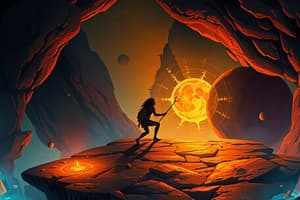Podcast
Questions and Answers
What event marked the beginning of mass production of reading materials?
What event marked the beginning of mass production of reading materials?
- Invention of printing (correct)
- Development of the telescope
- Era of enlightenment
- Scientific Revolution
Which scientific field experienced a shift from geocentrism to heliocentrism?
Which scientific field experienced a shift from geocentrism to heliocentrism?
- Astronomy (correct)
- Biology
- Physics
- Chemistry
What did the Scientific Revolution primarily foster in various fields?
What did the Scientific Revolution primarily foster in various fields?
- Increased artistic expression
- Philosophical debates
- Mass production techniques
- Scientific processes and experimentations (correct)
How is science best defined?
How is science best defined?
Which of the following best describes the role of the Era of Enlightenment?
Which of the following best describes the role of the Era of Enlightenment?
What is one major contribution of physics during the Scientific Revolution?
What is one major contribution of physics during the Scientific Revolution?
What aspect of science did Gribbin refer to with his historical perspective?
What aspect of science did Gribbin refer to with his historical perspective?
Which of the following was NOT considered a major field of advancement during the Scientific Revolution?
Which of the following was NOT considered a major field of advancement during the Scientific Revolution?
What does enframing mean in Heidegger's view?
What does enframing mean in Heidegger's view?
What structural change occurred in early human bones around 50,000 years ago?
What structural change occurred in early human bones around 50,000 years ago?
How did Aristotle describe humans?
How did Aristotle describe humans?
What significant development occurred following the practice of metal smelting?
What significant development occurred following the practice of metal smelting?
How did environmental challenges influence human development?
How did environmental challenges influence human development?
Which of the following best defines 'eudaimonia'?
Which of the following best defines 'eudaimonia'?
What was one of the early practices of hunters and gatherers?
What was one of the early practices of hunters and gatherers?
What does Rational Choice Theory suggest about human satisfaction?
What does Rational Choice Theory suggest about human satisfaction?
Which factor is NOT considered part of the social environment influencing humans?
Which factor is NOT considered part of the social environment influencing humans?
What role do humans play in Heidegger's concept of enframing?
What role do humans play in Heidegger's concept of enframing?
What is the origin of the term 'society'?
What is the origin of the term 'society'?
According to Aristotle, what is the primary outcome of humans pursuing their desires?
According to Aristotle, what is the primary outcome of humans pursuing their desires?
What would occur if humans ceased to exist, according to the content?
What would occur if humans ceased to exist, according to the content?
Which of the following statements about social life is incorrect?
Which of the following statements about social life is incorrect?
Which materials did early humans use to create tools?
Which materials did early humans use to create tools?
What academic field is associated with virtue ethics?
What academic field is associated with virtue ethics?
What is the ultimate basis of happiness for theists?
What is the ultimate basis of happiness for theists?
Which characteristic is NOT a feature of intellectual virtues?
Which characteristic is NOT a feature of intellectual virtues?
What does humanism emphasize about individuals?
What does humanism emphasize about individuals?
Which emotional trait is linked with intellectual virtue?
Which emotional trait is linked with intellectual virtue?
How does moral virtue develop according to the provided content?
How does moral virtue develop according to the provided content?
Which of the following is NOT considered an intellectual virtue?
Which of the following is NOT considered an intellectual virtue?
How do good thinkers approach knowledge?
How do good thinkers approach knowledge?
What motivates individuals with intellectual virtue?
What motivates individuals with intellectual virtue?
Which of the following best describes intellectual virtues?
Which of the following best describes intellectual virtues?
What role does experience and time play in the development of intellectual virtues?
What role does experience and time play in the development of intellectual virtues?
Which pair of characteristics does courage bridge according to the text?
Which pair of characteristics does courage bridge according to the text?
What role do instructions play in acquiring intellectual virtues?
What role do instructions play in acquiring intellectual virtues?
Which of the following statements about happiness is true?
Which of the following statements about happiness is true?
Which of these best defines persistence as a moral virtue?
Which of these best defines persistence as a moral virtue?
Which of the following distinctions between pleasure and happiness is correct?
Which of the following distinctions between pleasure and happiness is correct?
What is a common feature of intellectual virtues?
What is a common feature of intellectual virtues?
Flashcards are hidden until you start studying
Study Notes
Science
- Began with the invention of the printing press, which allowed for mass production of reading materials
- A body of knowledge about the natural and physical world
- It is an idea, theory, belief, and systematic reasoning and observations of the natural and physical world
- Enframing, by Heidegger, states that humans manipulate nature to serve our needs, instead of seeing it for what it is
- Modernizes the understanding and practices of science by leading to experimentation and scientific processes
Flourishing of Humans
- Homo sapiens are the backbone of today’s society
- Science and technology satisfy man’s material needs and desires in this world
- Human satisfaction is based on rational calculations dictated by personal preferences
- Humans are known as rational thinkers, capable of thinking and reasoning
- Humans forage, hunt, and fish for food consumption
- Humans practiced metals smelting which led to the use of bronze
- Humans domesticated animals for clothing, medicine, and shelters
- Humans started to permanently settle
- Humans have complex brains that changed due to environmental challenges, like climate, diet, food availability, group size, parental care
- Humans are social beings
- Interactions within social groups led to the formation of society, which allows for mutual support and the cultivation of culture
Eudaimonia
- It is a state of well-being and contentment that can be understood as happiness
- It is the ability to live a good life, where humans need to satisfy their needs and demands
- According to Aristotle, when humans desire ends, we reach eudaimonia, flourishing, or happiness
- Defined as a contented state of being happy, healthy, and prosperous
- An objective state that is the ideal emotional state of a well-lived life
Humanism
- Espouses the freedom of man to carve his own destiny and to legislate his own laws.
- Man is literally the captain of his own ship.
- Humanists see themselves not merely as stewards of creation but as individuals who are in control of themselves and the world outside them.
Intellectual Virtues
- Excellent personal traits or character strength that are deemed to be morally good for thinking and learning
- Intellectual virtues include: theoretical wisdom (thinking and truth), practical wisdom, and understanding.
- Experience and time are necessary requirements for the development of intellectual virtue
- Intellectual virtues are acquired by practicing, guided by instructions
- Intellectual virtues include excellent character traits, involve human emotions, intentions, motivations, and values, and are aimed at cognitive goods
- Intellectual virtue is about a person’s excellent disposition in life concerning decision making and criticism
Moral Virtues
- Moral virtues are controlled by practical wisdom
- Development is nurtured as a habit
- Moral virtues include: patience, courage, and perseverance
- Good thinking and learning require being intellectually careful, honest, with humility, and being attentive
- Moral virtues are about the ability to endure difficult circumstances, confronting uncertainty, and doing something despite difficulty or delay in achieving success
Pleasure vs Happiness
- Pleasure is a positive, enjoyable or worth seeking mental state that gives a feeling of satisfaction and enjoyment
- Happiness is a state of well-being and contentment
- Pleasure is a significant component of happiness
- Happiness will not last a lifetime
- Happiness is a state of well-being and contentment
Studying That Suits You
Use AI to generate personalized quizzes and flashcards to suit your learning preferences.




